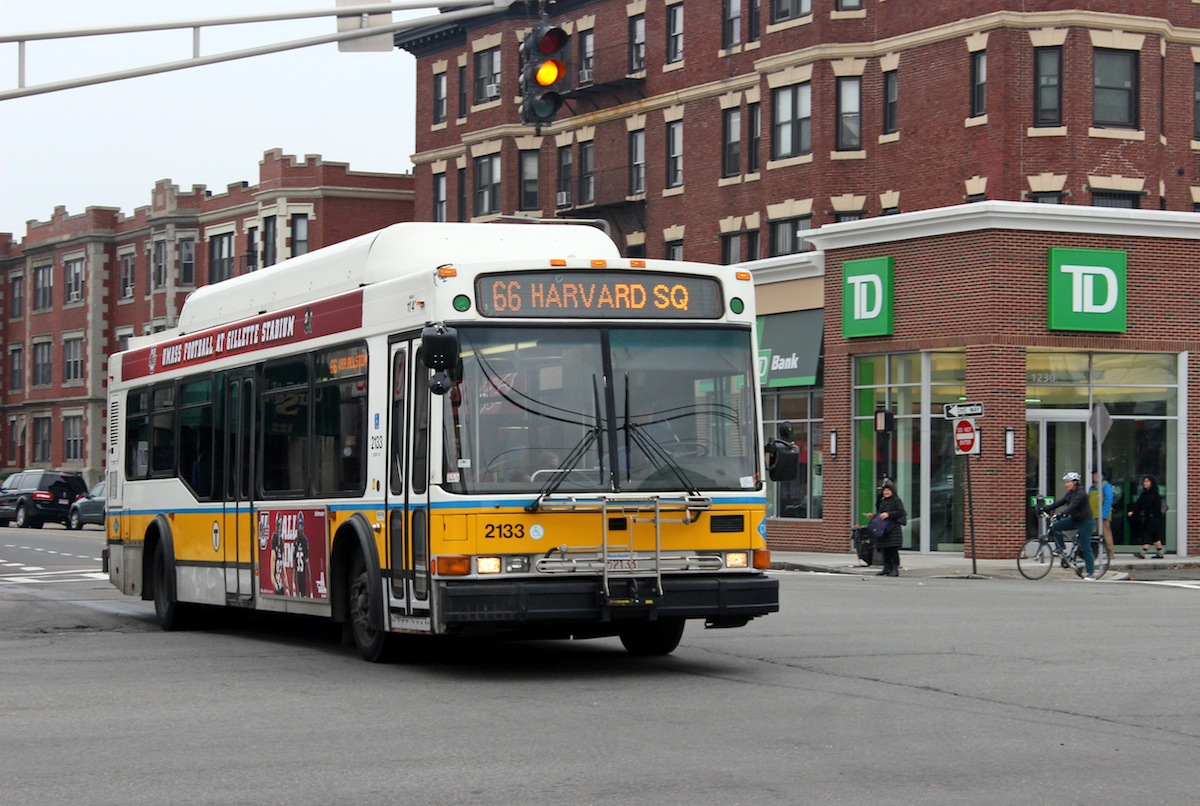MBTA Testing New ‘Turn Alert System’ on Select Buses

Photo by Olga Khvan
When Heather Townsend first heard someone say, “attention pedestrian, bus is turning,” she was confused. “I thought someone else was saying the bus is turning, but then I thought, ‘I’m not next to anyone else, that must be the bus,’” she said.
The voice Townsend heard, which was blasted from the outside of an MBTA vehicle traveling on Massachusetts Avenue, is part of a “turn alert system” installed in a handful of T vehicles.
According to MBTA Spokesman Joe Pesaturo, three years ago ProTran Technology approached the MBTA about testing its “Safe Turn Alert” technology on a single bus. The device audibly warns pedestrians in the area when a T vehicle is taking a left or right turn, telling them to get out of the way to avoid being hit, something ProTran claims is “one of the major types of bus accidents plaguing the industry,” especially in an age where people have their heads buried in their smartphones while walking down the street.
Now the MBTA is expanding on the program it first introduced in 2011, to see if it will be worth installing onboard when they buy newer buses in the future. Since the first one was fastened, seven other select buses that operate out of the Charlestown garage have recently been equipped with the special electronic devices. Pesaturo said two more are going into other vehicles soon.
On Tuesday, Pesaturo checked in with the T’s Bus Operations unit, and confirmed there are now a total of eight vehicles with the turn announcement system operating out of the Charlestown facility. “Two more systems are expected to be operational this month,” he said. “The testing program will include a total of ten buses. During the testing period, there will be an evaluation process to help determine if such systems should be included as part of future bus procurements.”
Pesaturo did not say how long the testing period would last. He said ProTran was the lowest bidder for the pilot program, and the cost for 10 devices came in at $94,000.
Townsend, who was first startled by the talking bus earlier this year, said the voice is audible enough from roughly 10-feet away. “I looked up because I thought, ‘am I just insane? Am I hearing voices? Am I in Stranger than Fiction?,’” she said.
While confused when she first heard it, she admits the audible messages might serve a good purpose. “I think the issues that we have between buses and bicycles, for example, might be better served with dedicated bike lanes. But from the point of view of could I hear it, and did I know what it was telling me? Yes. It did its job,” she said.
The MBTA isn’t the first transit agency to get tech-savvy with this type of alert system. Oregon’s TriMet system is now testing a similar technology, funded by the Federal Transit Administration. They first tried to incorporate the warning system on buses in 2011 after a driver allegedly hit a group of pedestrians. Citing a glitchy system they stopped using the devices, however. But now, Oregon officials are attempting to go at it again, claiming the technology has significantly advanced.
After hearing the turn alert system in action in Cambridge, Townsend made a Google inquiry and read about Oregon’s first attempt at introducing the talking bus system. “The problem they were having in Oregon, which I imagine could be the same here, is that the system is likely to go off every time a bus turns out of a stop,” she said. “I think that because it does it so much, people will be accustomed to it,” and they will stop adhering to the buses advice.
But Pesaturo said the T would simply wait to find out what the results of this particular program will be. “The effectiveness of the systems will be evaluated,” he said.

